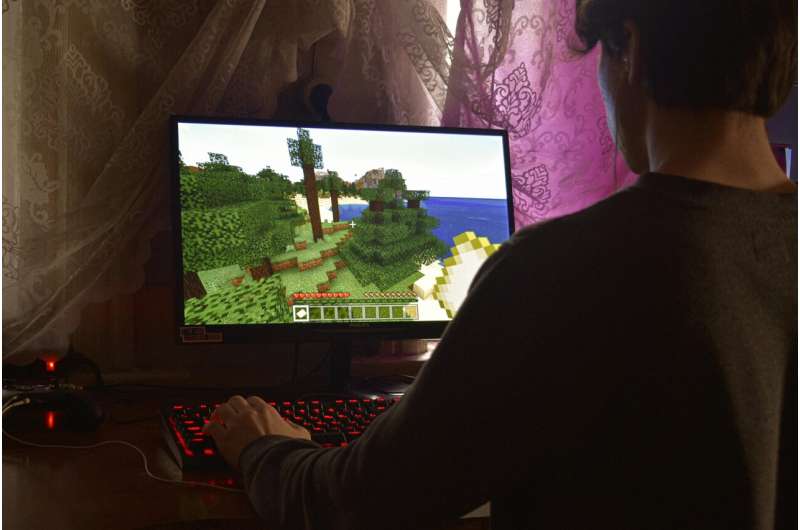This article has been reviewed according to Science X's editorial process and policies. Editors have highlighted the following attributes while ensuring the content's credibility:
fact-checked
trusted source
written by researcher(s)
proofread
How game worlds are helping health care workers practice compassionate clinical responses

A game world is a fantasy universe based on a story and a theme.
In learning contexts, such as in schools or professional continuing education, game worlds permit us to teach complex subjects in an engaging way by rehearsing competencies and roles in a fictional narrative.
But games also invite game users into contemplation. In the work of some researchers, contemplative learning is learning that enables deeper engagement by including elements from the learner's world that enhance the educational context. In a game world, this could mean enabling an understanding of other cultures, reviewing histories of ideas or reflecting on personal reactions to learning while inhabiting new roles and worlds.
With colleagues at the digital media program at Toronto Metropolitan University and the Baycrest Academy for Research and Education, our work is focused on designing game worlds that draw on contemplative learning to provide training for health care workers who provide or lead care. Our games are also now in use with the World Health Organization, the United Nations and with health care providers, educators and students in Ontario.
Values central to learning
Contemplative learning can go beyond simple reflection. Contemplative principles to trigger emotional responses in the learner can lead to self-actualization.
Through these emotional responses aided and guided by narrative, learners can experience a deeper understanding of self and their own lived world.
Contemplative approaches to learning and teaching are not only focused on acquiring knowledge and skills, but also on values and attitudes that are central to learning.
Game world built on myth
Meta-narrative refers to an overall ethical or mythological structure upon which the game world is based. It provides value-added learning that is difficult to effectively deliver through conventional simulation.
Judgments about the value of one's learning in the real world can be enveloped in meta-narrative.
In other words, mythological stories can elicit specific emotional responses in learners that encourage them to create new templates to organize knowledge and attitudes and enable "spiritual transformation." With regards to our game world design to train health care providers, spiritual refers to a quest for meaning, harmony, safety and compassionate responses in clinical care.
Our goal is to introduce and reinforce narrative as an engagement strategy to increase learners' emotional investment in training.
'The Carthage Chronicles'
Our first action adventure game, The Carthage Chronicles, is named for an ancient city in what is now Tunisia. Because Carthage was a great trading civilization, players engage in relational care practices with in-game characters from a wide range of geographies, cultures and faiths. The game world setting establishes that cooperation across nations and faiths is a better way to live than through conquest.
A meta-narrative of cooperation across diversity underpins the entire design. In this way, contemplative pedagogy and game world design is structured to help learners to deal with a multicultural and multi-faith professional world.
To date, more than 2,600 learners have completed The Carthage Chronicles to learn how to manage complex age-related conditions such as dementia. This is supported by Ontario's Ministry of Long-Term Care as a strategy to train personal support workers and nursing professionals in aging care.
Design, implementation and evaluation are managed by the Ontario Centres for Learning, Research and Innovation in Long-Term Care at Baycrest. This work is directed by Raquel Meyer, one of the authors of this story who holds a doctorate in nursing health services.
'Hypatia's Guild'
Following the success of The Carthage Chronicles, we then built a game world called Hypatia's Guild, which was also funded through the Ministry of Long-Term Care. Both The Carthage Chronicles and Hypatia's Guild are tailored to educators working in long-term care homes across Ontario on a platform called Learning Inter-Professionally Heathcare Accelerator (LIPHA).
In the Hypatia's Guild game world, set in contemporary Ontario, learners role play an immortal being as part of a team of 2,000-year-old superheroes.
As one of the first recorded female professors in antiquity, Hypatia was known as a brilliant philosopher, mathematician and astronomer. In our fictional narrative, Hypatia trained a guild of immortals to preserve knowledge of how to fight evil. Alongside the guild, learners rescue Earth from an alien invasion that leaves people in a state called "acedia." Acedia is a medieval term that refers to a loss of excitement and engagement in life.
Addressing loss of engagement, burnout
In the Hypatia's Guild game world, Hypatia and her guild of immortals represent good. They embody the energy that builds a life force by nurturing community, creativity and wellness, which in turn foster security, belonging, continuity, purpose, achievement and significance.
Players generate this energy by mastering educator competencies throughout the game. Aliens in the game represent evil; they spread acedia through authority, conformity and negative interference, which in turn leads to despair, fear, isolation, meaninglessness and burnout.
The narrative epitomizes a loss of engagement—what could be considered a form of acedia—that is present in health care work.
Burnout or depersonalization are risks in care-giving situations where work demands far exceed personal and organizational resources. Most recently, these risks were exacerbated by the pandemic, especially in Ontario's long-term care sector. Systemic, organizational and personal interventions are needed to address these challenges.
Deepening competencies
User evaluations of Hypatia's Guild attest that through the game, long-term care educators find meaning in their role, deepening their competencies.
Role play enables educators to discover educational resources that enable them to positively shape organizational, team and individual experiences in these care settings.
In this way, learning is deepened beyond acquiring knowledge and skills. Instead, it's grounded in reflecting upon and practicing values and attitudes conducive to ongoing learning and celebrating a diversity of life stories.
This article is republished from The Conversation under a Creative Commons license. Read the original article.![]()



















